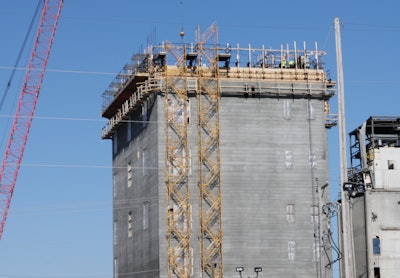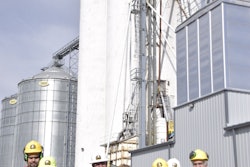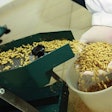
I’m a firm believer that in truly difficult times, your character is not developed, it’s merely shown,” said Riley Didion, president of Didion Milling, based in Johnson Creek, WI.
For Didion, that difficult time came when his family-owned company’s dry corn mill in Cambria, WI, experienced a tragedy on May 31, 2017. An explosion tragically killed three of the 16 employees working at the facility that night — weeks later two died in the hospital from their injuries.
More than 20 local fire departments, along with The Red Cross, Salvation Army, and several other agencies, arrived to extinguish the resulting blaze and to aid the injured. The mill was a complete loss.
In Didion’s case, the character that showed through is one that is dedicated, trusting and humble — all values which are reflected in the company’s culture.
The milling company specializes in converting grain into ethanol and value-added ingredients for the food processing and brewing industries, and also manufactures a complete line of food ingredients and complete foods for famine relief. Formed in 1972 by brothers John and Dow, Didion Milling started as a grain merchandising firm in Johnson Creek. Today, the company operates in four locations throughout Wisconsin.
Feed & Grain editor Elise Schafer sat down with Didion Milling’s president, Riley Didion, and Amy Jones, human development manager, to learn how the leadership team responded those first days after the incident, what operations look like today, plans for the future and how their culture helped guide their decisions from day one.
Initial response
Didion said once the incident occurred, the executive team immediately drew on its business interruption plan. One of the first items outlined was to conduct a companywide staff meeting, which was held at a nearby church the following day.
As difficult as it was to hold a meeting while in mourning, Didion said, “From an operational perspective, and I mean this with all due respect, we had to ‘normalize’ the situation — tell the team ‘this is all the information we know right now and this is what has to be done.’”
Employees quickly took initiative in completing tasks outside of their everyday duties in order to fulfill the organization’s highest priorities.
“Our initial focus right afterward was to identify our priorities — first and foremost, we knew we needed to take care of our teams,” said Didion.
Leadership quickly arrived on a short list of top priorities:
- Ensure employee safety and well-being
- Take care of their teams
- Take care of customers and producers
Ensuring employee safety and well-being
In the immediate aftermath of the incident, Didion leaned on first responders and local authorities to rescue the survivors, extinguish the subsequent fire, ensure the structure was no longer hazardous and secure the perimeter.
An ethanol facility on-site remained closed for roughly five weeks as a precautionary measure to ensure the plant was operating as safely as possible.
In addition to safety, the next priority was the well being of its employees, many of whom feared for their jobs in light of the complex shuttering. To help restore their sense of security, Didion committed to not laying off a single employee at its initial company meeting.
“We understood and respected the decision of those who chose to leave, and we committed to keeping everyone employed, not impacting people’s insurance and continuing to invest in their 401k.” Didion said. “That means people had to wear different hats, and we stuck to that commitment.”
Jones added, “We immediately engaged our teams in meaningful work to keep their spirits up and to help them feel a sense of purpose.”
With no work available for mill employees, the human development team got creative and devised a work-sharing program with other companies in the community looking for the skills that the displaced workers possessed.
“Because of the market, employers have many more jobs to fill than people available,” Jones said. “So we created an arrangement where they lease our employees, allowing individuals to remain on our payroll, continue to receive our benefits, accrue tenure, and they continue on our 401k. They were also invited to and attended all company meetings and events. The message to our employees was: you are still a part of the team.”
The response to the program has been overwhelmingly positive. “We’ve interviewed the companies and the feedback we’re getting is just astounding,” Jones said. “One company reported a 65% increase in output with our team there.”
Meanwhile, Jones worked with the company’s insurance carrier, Nationwide, to provide grief counseling to help cope with the loss of their fellow crew members.
“Together we located somebody who had been at 9/11,” Jones said. “We acquired a trailer and set it up in Cambria so any employee could walk off the job at any point to visit with the counselor. We have people who went once, people who went a couple times and some had a regular appointment for counseling.”
Weeks later, Didion extended the services into the community for the paramedics and firefighters, and any other first responders who struggled with grief after responding to the incident. (See more on how the community continues to benefit from this service on pg. 24.)
Taking care of customers and producers
The company immediately connected with each customer on both ends with information about the closing of the mill and ethanol operations in Cambria. Its merchandising team worked quickly to restructure certain contracts, push delivery time periods out, recommend other outlets where their customers could get similar cost supplies, and in rare cases, cancel contracts.
Despite the service interruption, many customers responded with patience and were dedicated to Didion’s recovery. The outpouring of messages of condolences, prayers, and support was overwhelming.
“We are truly blessed to have the relationships that we have with our customers,” Didion said. “When you go through an incident like this, you see the strength of these relationships. We couldn’t have asked for a better partnership with all of them.”
Once the ethanol plant reopened, the location began receiving corn again for ethanol production; however, some farmers continue to feel the impact of the closed milling operation.
“We’ve reduced the amount of corn we purchase, but made sure to keep regular communication with our farmers” Didion said. “We’ve tried to increase that amount steadily, but it’s still below what it would be if both operations were in place. I know the producers are excited for us to be back up to fully operational.”
In the meantime, Didion continues to deliver market and growing condition information, and hold classes on drying techniques and other grain quality practices. They also bring their end customer base together with their producer base to cultivate those relationships.
As an ongoing effort, Didion keeps its customers up-to-date on the progress of the rebuilding of the dry corn mill with regular communication via email and social media.
Rebuilding the mill
From the beginning, for Didion’s leadership it was never a question of “if,” but “when” they would rebuild in Cambria. They spared no time in selecting a talented design/build firm and creating a design plan for the new structure.
Construction began on the sixstory, concrete slip-formed dry corn mill in mid-December and finished the exterior walls by the end of 2017. The remainder of the project includes the detail work, such as installing roofs and floors and equipment placements.
“Our goal is to be operational again in mid to late Q1 of 2019,” said Didion.
From a human development standpoint, the recovery is well on its way, too, according to Jones.
“We’ve started hiring again for some technical positions — engineering and IT roles,” Jones said. “They will be key as we implement some of the latest technology in the new mill.”
Jones is also looking for talent internally to identify those who may be interested in taking on a different role than they had before the incident. Some mill workers had already begun coursework at nearby technical colleges to pursue their aspirations, and Didion is dedicated to supporting their development and elevating their roles in the future.
Didion also recently invested in its employees by having all supervisors attend a two-day High Performance in Action (HPIA) training, part of the company’s High Performance Work Practices (HPWP) business model. HPIA has a strong focus on change management and how to lead a team through times of change.
Company culture key to future success
Didion and Jones attribute the success of their ongoing comeback to the company’s culture and values. Jones elaborated, “We started using a model of driving culture called HPWP about seven years ago, and it’s a very non-traditional way of hiring and managing your talent.”
For example, the company forgoes employee handbooks and does not rely on official rules and policies to direct daily decisions. Instead, Didion hires people who Jones calls “hungry, humble, smart,” and bestows a high level of trust on them to make the decisions needed to conduct their work.
“We believe if we hire the right profile of person who’s passionate, dedicated and wants to do the right thing, we can train them on the technical part of the job,” said Jones. “Our non-traditional approach and the caliber of people we hired helped us get through the incident. Even when we had to temporarily put pay increases on hold and cut employees’ overtime, they still wanted to be a part of our team.”
The team continues to experience both tough days and high points together on the road to recovery. With the one-year anniversary coming in a few months, Didion still has a way to go in returning to normalcy, but has already made significant strides toward achieving its goals.
“Looking ahead at May 31 this year, success for me would be for our teams to feel confident about the direction of our company and can recite where we’re going,” Didion said. “I hope they would view the anniversary as another significant step in our healing process. We’ve found a way to remember those that we’ve lost while embarking on this new journey. We want their memory to carry us forward — with one foot remembering what happened and the other foot moving into the future.”





















